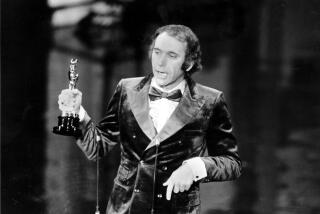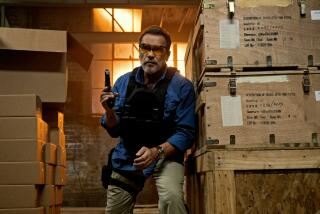PERSPECTIVE ON JIMMY HOFFA : Making a Folk Hero Out of a Thug : Film’s revisionism can’t erase the record: the former Teamsters boss was a mobster who plundered his union.
- Share via
For almost four years, while I was a member of Robert F. Kennedy’s organized crime and racketeering group of special prosecutors at the Justice Department, people regularly asked if I was part of the “get Hoffa” squad. I wasn’t, but I always resented the insinuation that my colleagues who were investigating and prosecuting Teamsters’ crimes were “getting” Hoffa. Were we “getting” organized crime figures? Are local prosecutors “getting” a criminal on the loose?
Kennedy and Hoffa were notorious enemies, and why they were is an important chapter in the history of labor and of law enforcement. Unfortunately, the new movie “Hoffa,” written by David Mamet and directed by Danny DeVito, distorts that history, much as Oliver Stone’s riveting movie “JFK” distorted the history of President Kennedy’s assassination. Ironically, if the speculation of the House Assassination Committee is correct, J.F.K.’s killing and the clash between R.F.K. and Hoffa may be related. But one would never suspect that from the two popular movies.
Let the record reflect the real Jimmy Hoffa story. There are copious court records of Hoffa’s criminal convictions for defrauding his union’s pension funds and jury-tampering and numerous good books on his shameful career. They portray Hoffa as a thug who plundered and discredited a mighty union, cavorted with organized crime and corrupted public officials. Sen. John L. McClellan (D-Ark.), whose Rackets Committee conducted exhaustive investigations into the Teamsters, called Hoffa a “fountainhead” of union corruption who was faithless to the rank-and-file members and used gangsters and racketeers to do his dirty business.
In 1957, the AFL-CIO threw out the Teamsters, its largest constituent, for refusing to cooperate in an internal corruption investigation. For decades thereafter, the Teamsters were monitored by court orders, and only this year has a reformer been elected Teamster president, promising to end decades of plunderous mismanagement.
A recent “Frontline” documentary on PBS, “J.F.K., Hoffa and the Mob,” included interviews with long-time Hoffa lawyer Frank Ragano disclosing that Hoffa had been in on planning the Kennedy assassination with the same Mafia leaders the House Assassination Committee speculated had “the motive, means and opportunity” to kill the late President. Hoffa, like the Mafia leaders, was being threatened by Attorney General Robert Kennedy; because of Justice Department efforts, they were losing their grips on their power and money.
Robert Kennedy’s book based on his congressional rackets investigations, “The Enemy Within,” almost made it to the movies. Why it didn’t is an interesting story. In the 1960s, fresh from the success of the classic “On the Waterfront,” director Bud Schulberg came to Washington to meet Robert Kennedy and to discuss making a movie based on “The Enemy Within.” Schulberg immersed himself in the 59 volumes of McClellan Committee hearings.
Schulberg said the record had “testimony of thousands of witnesses who talked (or balked) about pension funds looted of millions of dollars, with a majority of those six- and seven-figure loans going to notorious Mafiosi, of ‘sweetheart’ contracts arranged between greedy company executives and union officials on the take (including Hoffa) of once-respectable industries and unions infiltrated by a blatant array of extortionists and enforcers, terrorizing the would-be honest into silence or connivance.”
Schulberg decided he would make a movie about “the increasingly effective alliance of big money, labor racketeers, the mob and dishonest . . . government officials.” As part of his research, Schulberg interviewed investigators and union officials, including one honest Teamster officer who had become disgusted by the “wholesale looting of union funds, the terrorizing of union members who protested, the Mafia leaders allowed to pass themselves off as union leaders.”
Schulberg wrote his script for producer Jerry Wald. But Wald died suddenly and their deal with 20th Century Fox did too, Schulberg wrote, when “a labor tough walked right into the office of the new head of the studio to warn him that if the picture was ever made, drivers would refuse to deliver the prints to the theaters. And, if they got there by any other means, stink bombs would drive out the audiences.”
Schulberg tried to produce the movie himself, he wrote in 1972. One film star came to his home drunk to say he loved the script but was afraid he’d be killed if he did it. Ties between the mob and other studios led to the movie being rejected by the major studios, despite Schulberg’s exceptional reputation. Columbia, which had released “On the Waterfront,” expressed interest; but on the eve of Schulberg’s meeting with studio executives, they each got a letter from Hoffa’s lawyer stating that Fox had wisely abandoned the project when “all the possible eventualities had been pointed out to them” and urging that Columbia do the same. The meeting was canceled and the real Jimmy Hoffa movie was not made.
With the new movie, I wonder what the verdict on Hoffa will be in the court of public opinion. Will he be seen as a crook, as the movie Schulberg never made would have portrayed him, or as the folk hero of DeVito’s fiction? If a new generation believes the latter, Hoffa will have fixed his last jury.
More to Read
Only good movies
Get the Indie Focus newsletter, Mark Olsen's weekly guide to the world of cinema.
You may occasionally receive promotional content from the Los Angeles Times.







